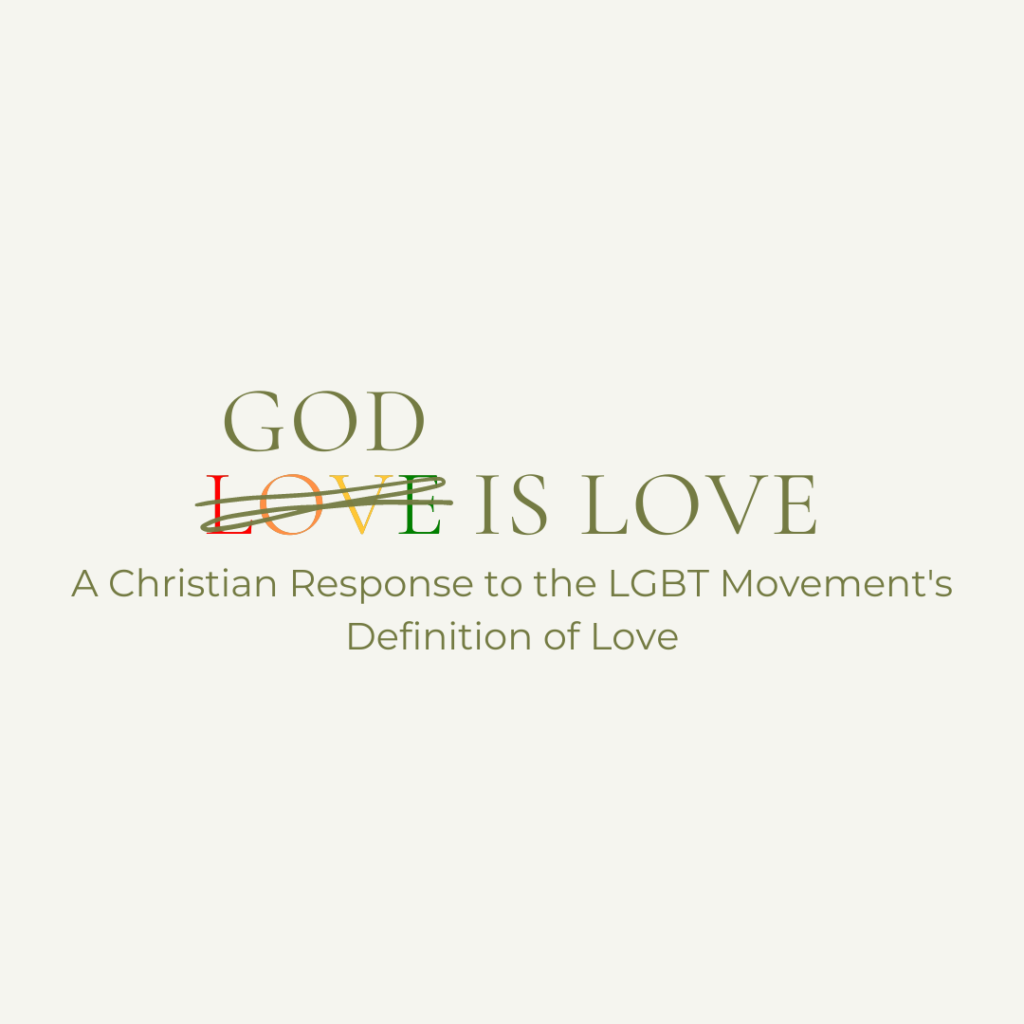Perhaps one of the most intimidating attacks the average Christian faces is the accusation of being unloving toward homosexuals. Our modern culture briefly and clearly summarizes its position on the issue with the mantra: Love is Love. And how could one disagree? Such a small sentence masterfully hides its loaded message. Beneath this short phrase lies a fundamentally unchristian belief that love is whatever we define it to be.
What is the Biblical definition of love? For the answer, we go to 1 Corinthians 13[1]. This chapter is divided into three main sections. The first section (vv. 1-3) tells of the tragic state of the Christian who outwardly shows the deeds of love yet does not have love in the heart. The second section (vv. 4-7) lists the excellent characteristics of love in a believer. The last section (vv. 8-13) ends Paul’s argument for the primacy of love in a Christian’s service to God since love will outlive even faith and hope.
In the first section of this chapter, we find a shocking message. It is possible for a Christian to do many great works for God and not truly have love in the heart. A Christian may speak in a spiritual language, prophesy with great understanding, give away all earthly possessions, and even die for the faith without having love for God. This is no small error. These works, being done without love for God, are an annoyance, meritless, and unprofitable to Him. This is the resounding message of the apostle: love is not an act. Love is an emotion.
So, is that all there is to it? If love is a feeling, then how can it not be subjective (defined by whatever a person thinks he feels) as the LGBT movement confidently states? The inspired apostle Paul continues to describe love as an essentially moral emotion. Love is patient, kind, rejoices with the truth, bears all things, believes all things, hopes all things, endures all things. Not only that, but love is not envious, boastful, arrogant, rude, selfish, irritable, resentful, nor does it rejoice in wrongdoing. In short: Love is an emotion of good will toward another. Love desires the betterment of the object of love. Love is inseparable from morality.
Those who support the LGBT movement believe the same, although they would define morality by a groundless standard. A Christian who seeks to save the homosexual from an eternity of suffering in hell is considered, regardless of his subjective emotions, unloving. A Christian who stands outside an abortion clinic to plead with mothers to spare the life of their unborn children is seen, by the LGBT supporter, as hateful. The modern-day progressive does not think that love is entirely subjective but joins love to a different moral code; one that is antithetical to God’s word.
The Christian response to the world’s mantra is, “God is love” (1 John 4:8, italics mine). Because love is necessarily moral, we must go to the final authority for all morality. Morality is not an atheistic or agnostic category. Morality assumes a law-giver. It assumes an objective standard that one meets or falls short of. That Lawgiver is God; that standard is God’s word. Our culture thinks it is loving to affirm sexual sins. Because God has spoken to us, the Christian knows that love “does not rejoice at wrongdoing” (1 Cor 13:6) but tries to bring back a sinner from wandering to save his soul from death (James 5:20).
By abandoning the solid ground of God’s word, our culture cannot consistently hold to any sexual ethic. If homosexuality is morally acceptable, why is incest or polygamy immoral? If ‘consent’ is the linchpin of our culture’s sexual ethic, why stop the adult daughter from marrying her adult father? The Christian, on the other hand, has a firm foundation when defining love. We know that God is the very standard of love, and we love by imitating His character and obeying His word. Here are two portions of scripture that make this point clearly:
“By this we know that we love the children of God, when we love God and obey his commandments.” 1 John 5:2
“And this is love, that we walk according to his commandments;” 2 John 1:6a
A Christian who seeks to save a sinner from the punishment we all rightly deserve is the one who truly loves the sinner. And we have all sinned against God. We have all lied, stolen, cheated, lusted, and rebelled against God’s good laws. But Christ was offered upon the cross to bear the punishment we deserved. The Lord suffered in the place of all who trust in Him. Jesus rose triumphantly from the grave to show that His death was approved by God so that He can give every believer a hope of dying and rising to eternal life with the Father. I hope that you will believe in Him today. As you read this, know that I have prayed for you. Trust in Christ and you will see that your debt of death has been fully paid by Him. May the Lord grant it. Amen.
[1] Unless otherwise noted, the Bible quotations and references use the ESV.





